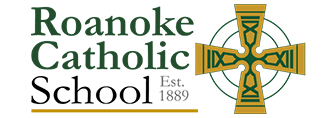Welcome to Roanoke Catholic’s Early Childhood Program! Open to children ages 3 and 4, our Early Childhood Program is dedicated to the physical, social and emotional development of the young child in a nurturing Christian environment. Each school day is planned with appropriate age-level activities to enhance socialization skills, personal independence, physical development, and basic readiness instruction in a comfortable, happy, play-oriented setting. Indoor and outdoor play are part of each day.
Our Early Childhood Program consists of Early Learners (ages 3 and 4) and Junior Kindergarten (ages 4 and 5).
Standards for Early Learners build foundational skills and allow for children to transition into a more structured setting while preparing them for Junior Kindergarten. Standards for Junior Kindergarten continue to build upon those foundational skills and focus on essential Kindergarten readiness skills. These standards allow for scaffolding of skills, multi-sensory teaching and learning, problem-solving, spiritual growth, and differentiation of instruction.
All applicants must be able to toilet themselves independently.
Highlights
- Classes for 3 and 4 year olds
- Certified, licensed teacher
- Music, PE, and Library
- Prayer Buddies with older students
- “Tadpole” communication with parents
- Mass & Prayer Services during Second Semester
- Daily Recess
- Community Outreach Service Projects
- Field Trips
- Religion Lessons
For more information or to schedule a tour: Michelle Schmucker, Admissions & Advancement Coordinator, at 540-982-3532, ext. 1012, admissions@roanokecatholic.com.
Operation
Fully certified teachers and aides staff our classrooms as needed to support our 1:10 staff-to-student ratio.
Program hours are 8:00 am -2:45 pm Monday-Friday.
Cost: $643/month for 10 months. Registration is $85 per child, which includes insurance and some supplies. After-school care is available for an additional fee.
Student Acceptance
Each child must have all age-appropriate immunizations required by law, and must furnish a documented copy of such immunizations and their dates of administration before admission. Each child must have had a physical examination within the previous twelve months prior to admission and must furnish a copy of the physical to the school nurse. Students who meet the proper age and health/immunization requirements should apply online.
Daily Activities
Each day consists of prayer, both child-initiated and organized play (indoor and outdoor), basic language arts, math, science, gross/fine motor skill activities, and self-care skills. Formal classes led by the school specialists in physical education, music, library, and art occur weekly. Occasional field trips are also a part of the program as long as proper car-seat regulations are maintained or the trip is within walking distance.
A primary goal in our Early Childhood Program is to build self-esteem. Students are encouraged to develop a sense of independence and interdependence, learning the social skills necessary to be part of a group. Our program also fosters self-discipline and a love of learning, tapping the child’s natural sense of curiosity.
Uniforms
Early Childhood Program students are required to wear the school uniform. Velcro shoes are required. Our uniform distributors are Tommy Hilfiger, Flynn & O’Hara and Jammin’. Also check our Uniform Closet where items are $1 each. Please see Lower School Uniform Guidelines for details.
Early Childhood Program Curriculum
Religion: Students learn to pray spontaneously and formally. They learn the Sign of the Cross, Grace before meals, the Our Father and the Hail Mary. Bible stories, weekly Chapel, as well as the liturgical seasons of Advent, Lent, and Easter, are part of the curriculum. Religion emphasizes recognizing that our actions affect others, respecting everyone, and getting along with others.
Language Arts: Students learn both uppercase and lowercase letters through letter books, letter characters, and song. Each week students learn a different letter along with its sound. Students learn to form the letters of their names correctly starting with an uppercase letter followed by lowercase letters. They practice language skills including rhyme, sequencing, and speaking before a group. Reading books is a daily part of the curriculum.
Math: Students learn to count to at least 31 during the daily calendar activities. Introducing numbers 1-20, recognizing numbers 1-12, recognizing shapes, counting objects, creating graphs, identifying patterns, and sorting, and classifying objects are all part of the curriculum.
Social Studies/Science: The curriculum groups social studies and science information in weekly units. Topics include seasons and holidays as well as space, community helpers, shapes, colors, fire safety, dinosaurs, the ocean, dental health, transportation, families, insects, the five senses, and zoo animals.
Physical Education: Students take physical education classes twice a week with the elementary physical education teacher. Inside and outside play is part of the daily curriculum.
Music: Students meet with the school’s music teacher once a week. Music is an integral part of the curriculum. Students learn a variety of songs and fingerplays in music class and in the classroom. They participate in an annual Christmas program.
Library: Students have a library period each week. During their visit to the library, they explore different types of literature with the school librarian and may check out books.
Art: Art is part of the daily curriculum. Each weekly themed unit includes an art project. Students use different media to complete each project. Cutting, gluing, and painting are among the techniques students practice. They also visit the school’s art teacher once a week.
Field trips: Field trips enhance the curriculum. Trips differ each year but have included the fire station, Mill Mountain Theatre, a pumpkin patch, storytime at Gainsboro Public Library, Kids Square, the O. Winston Link Museum, and a bakery.
